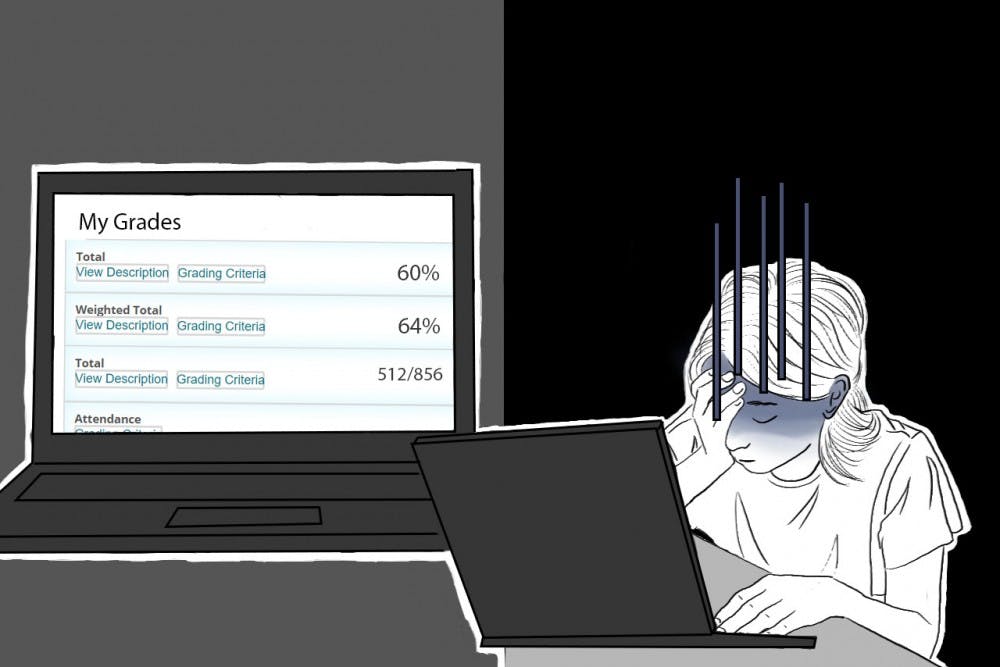For ASU students, failing a class can be rectified with the help of tutoring services, hard work and help from academic advisors.
Robert Alford, an academic success specialist in the Ira A. Fulton Schools of Engineering, said the first step when addressing a class failure is understanding why it happened.
“I really feel like students need to be honest with themselves,” he said. “Was it a studying issue that can be corrected? Was it a passion issue, that they just don’t like the subject and don’t want to do it?”
He said if a student's failure comes from not understanding class material, there are advisors and other resources available.
“Often times students don’t use the resources that are available like tutoring, like seeing an instructor during their office hours,” Alford said. “Those are really important.”
If students decide early on that a class is not working out, he said they can preemptively withdraw from it at the beginning of the semester. Some students may find a “W” on their transcript intimidating, but he said it is not necessarily concerning.
“If you have a setback ... that’s natural,” Alford said. “It actually shows some growth.”
Alford said for students who do end up failing a course, ASU offers an opportunity for students to retake 12 credits worth of classes for full GPA replacement. Both grades still appear on the transcript, but the GPA is only affected by the new grade.
After the 12 credits are used, the old failing grade and the new grade are averaged in the GPA.
But for students who fail their classes due to a lack of passion, Alford said the available route is much different.
He said many students come into ASU having had success in high school in certain subjects but realize in college that they are not truly passionate about them.
“If you fail (a class) and you change your major to another program, you’re not quitting, you’re redirecting your efforts,” Alford said. “It’s only a failure if you quit.”
Alford said it is vital to consult an advisor and figure out the best action plan if a student doesn't feel comfortable in his or her major.
“Sometimes we get tunnel vision on the road we’re taking, and I think sometimes some students need to look at other roads,” he said.
Lawrence Hennessy, a former computer systems engineering major at ASU, said that it was failing a class that helped him realize he was headed down the wrong career path.
During his freshman year, Hennessy said he withdrew from a calculus class, retook it his second semester and failed.
“I realized that if I’m going to do engineering, I’m going to have to do all this math, and that’s not something I really want to do or can do,” Hennessy said.
He said the key to moving on from the tough situation was to find something he was more passionate about. Hennessy, who would now be a sophomore, takes classes at Mesa Community College and plans to return to ASU in fall 2018 to study economics.
“I’m very glad I’m not doing any of that anymore,” he said. “Don’t be afraid to back out and re-examine what you want to do.”
Sophomore sports journalism major Jeremy Buch said failing a class freshman year was merely a setback on the path he knew he wanted to take.
Buch said it was a mix of taking on too many extracurricular activities and poor time management skills that led him to be unsuccessful in his news writing and reporting class.
However, he said he is thankful that the experience taught him he is able to recover from failure.
“If I (fail a class) it’s not the end of the world,” Buch said.
Buch said he is taking the class again this semester and is much more successful with the help of tutoring services. He said he hopes other students in his position don’t feel too embarrassed about failing.
“Just don’t be afraid to go for help because you feel like you’re stupid,” Buch said.
Reach the reporter at mlutesad@asu.edu or follow @mackinleyjade on Twitter.
Like The State Press on Facebook and follow @statepress on Twitter.




